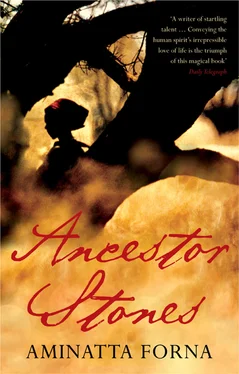I watch her and wish she would just go away.
In time my wish came true. This time she headed to the South. We saw her again, from time to time. Always when my father was away. She never did pay him back. She was in debt to him for the rest of her life, like the men whose lives he owned, unable to marry again until such a time as she repaid her bride price.
As for me, I no longer wanted her for my mother. I could not bear to be reminded of that awful time, I just wanted everything back the way it was before. Ya Memso treated us well. She even started a marriage box for me, with the cloth my mother brought. And gradually she added things she made herself and things she bought.
In the beginning Yaya talked about her a lot, wanting to know whether I remembered this or that. Like the way she could fold her tongue in two. The way he could and I couldn’t. Once he asked me to sing a song, a lullaby. I told him he was far too old for such things. Next he wanted us to go out to the main road and find a lorry to take us south. It was foolishness.
People change as time goes by. As you change yourself. I wish she were here, so I could tell her the things I understand now that I didn’t then. You look a bit like her, around the eyes. Maybe the shape of the face. Yes, an oval face — your father’s. People sometimes thought she came from somewhere else.
For a long time I would not let myself think about her. The years passed. A question sat itself down on the edges of my mind. Just beyond my subconscious. Like a patient pet waiting to be noticed and allowed inside. And the question was this. Why did she refuse to swear? Why did she turn away and refuse to swear her innocence?
Well, did they or didn’t they? The Tenth Wife and the Cement Man?
‘Guilty,’ cried the elders one, two and three. Obvious to anyone but a fool. But a time came when that wasn’t enough for me. She insisted my father had threatened her. I thought about it for a long time.
She could have worn the clothes of the victim. She could have pleaded and begged. But she refused. When the moment came she saw her choices, she could not betray herself, seeing what her life would become. She told the elders she was faithful. But when the people from his village brought the sassa forward and demanded she vow on her own life that there was nothing, in that moment she saw the starkness of her choice.
In the game of warn an opponent faced with losing must sometimes sacrifice in order to win.
She didn’t shrink from it, the way Soulay told us. Rather she refused it. Turned her back on one life, turned the corner to a new one. Because she had nothing left to lose.
Or so she thought.
This was what I believed for a long time. Then another day I looked again and found there was a different thought sitting in the exact same place I found the last one.
At the river, that day — the day Yaya and I swam with the Cement Man — my mother sat on the bank and watched us. And she saw in him the same thing we had seen. A man who wasn’t like other grown-ups. A man with pink-splashed lips. Orchid petal lips. And she could not bring herself to swear because she knew something.
She knew that in her heart that she had wished it.
6 Asana, 1941: Bitter Kola
My mother told me: ‘Before you are married keep both eyes open and after you are married close one eye.’ But when I was young I closed my ears instead. I refused to listen to my mother. All I wanted was to get as far away from her as I could, you understand? And so I did the very opposite. I knew that in so doing I might hurt myself, but it mattered more that I hurt her.
Where to begin? I gave myself away. That’s the beginning and end of the same story, the whole story, start and finish. Not to become a first wife, no. Nor even a second. I threw myself away to become some man’s third wife. And would you think perhaps that man came from a ruling family, or was rich, or respected, or held an honourable position in the men’s society? I would understand why you might think so.
But, no. It’s true to say Osman Iscandari was none of those things.
After I married I learned a lot. I did not learn so much about men — after all, Osman Iscandari was not all men. Rather I learned about myself. I learned about us. I learned about women — how we are made into the women we become, how we shape ourselves, how we shape each other.
The day I married I rode to my husband’s home on a maka carried by four makamen dressed in tunics and trousers edged with green and round felt hats with long, black tassels. They jogged barefoot. At times lifting me up over roots and stumps, at other times raising me high above their shoulders as they waded through streams. I lay back and dreamed in the silence. The makamen were graceful as mimes. I admired this about them as I swung under the shade of the canopy towards the border of our chiefdom: away from my home and towards a new life with my husband.
Behind me came the load bearers carrying the luxuries bought with my bride gift — a bride gift so great it was the talk of the town. That was how everyone knew that this man loved me, from the day he came to put kola. For days I begged my father — out of my mother’s hearing — until I persuaded him to receive Osman. On my beloved’s second visit I wore the new tamule and lappa he had sent for me. I stood behind my father’s chair and gazed at him, unable to believe my own good fortune.
At the crossroads that marked the border the makamen lowered me to the ground. I climbed to my feet, gathering my gown up in both hands. My husband’s makamen were waiting for me. Their uniforms were a little shabby: short trousers and striped shirts like a football team. Still, I determined not to let this bother me. Instead I settled on to the bed and arranged the folds of my yellow gown in a way I thought made me look elegant. The edges of the gown were scalloped and embroidered with butterflies. My mother thought I had made a foolish decision. Still, she would never allow anyone to say she had not sent a daughter to her husband in the proper manner. Early in the morning she had roused me to begin preparations. Kaolin from the river bank had made my complexion soft and even. Oil scented with lemon grass had been massaged into my skin and left my body gleaming. The soles of my feet buffed smooth. The edges of my hands and feet painted with henna to highlight the contrast of my palms and my soles with my skin. My teeth shone white from chewing egboka leaves, so bitter they numbed my tongue and left me barely able to taste a single dish of my wedding breakfast.
And when she had finished dressing me my mother placed the brocade sash over my shoulder and stepped back, nodded and left the room.
Now I smiled to myself. I imagined the expression on my husband’s face when he saw me for the first time. No longer a girl, but a woman.
I lay back, propping myself up on one elbow so that I could see where we were going. It wasn’t easy to do. The maka rocked so vigorously from side to side. I thought nothing of it: we were on an underused path. As we neared the town the paths would broaden and the makamen find their stride. I tried not to think too much about how crushed my gown was becoming; I concentrated instead on the sky and the ever-changing patterns in the canopy of trees.
I was thrown out of my reverie by a sharp pain.
‘Be careful!’
No reply. I tried to sit upright but my arms were pinned down by the steep sides of the hammock. The rocking and jostling persisted. I began to feel nauseous, saliva flooded my mouth. I struggled so hard I all but tipped out of the hammock. The makamen came to a halt and stood watching me as I tottered to the side of the path. There, in one great heave, I deposited my wedding breakfast into the undergrowth.
Читать дальше












